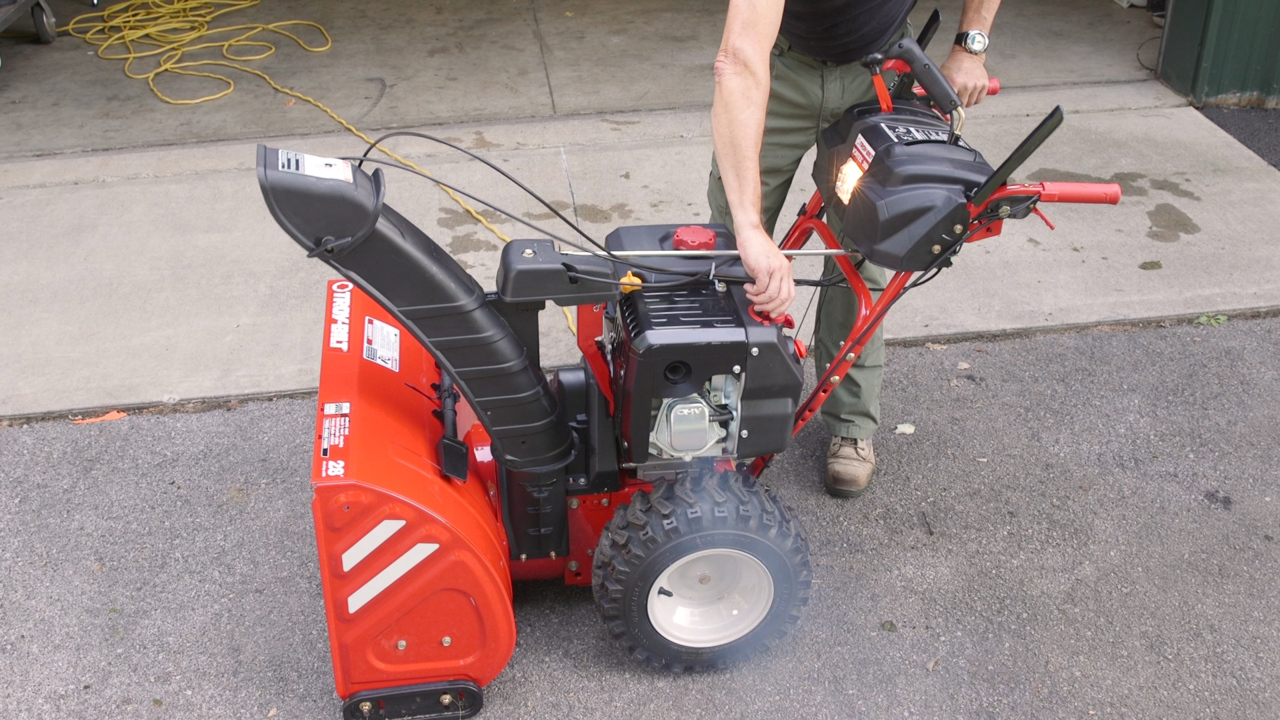Wondering whether to use premium gas in your snowblower? It’s a question that often pops up when we think about maintaining our outdoor power equipment. So, should you consider pouring premium fuel into your snowblower? The answer to that query isn’t as straightforward as a simple yes or no.
When it comes to choosing the right type of fuel for your snowblower, many factors come into play. While some experts suggest that using premium gas could enhance performance and prevent potential engine issues, others argue that regular unleaded gasoline is perfectly suitable for most snowblower models. It’s essential to consult your snowblower’s manual to get a clear understanding of the manufacturer’s recommendations regarding the fuel type. By following their guidelines, you can ensure optimal performance and longevity for your snowblower, no matter the snowfall amount or the freezing temperatures you encounter. So, before making a decision, take the time to do a little research and consider factors such as the age, model, and specific requirements of your snowblower to determine whether premium gas is truly necessary.
Benefits of Using Premium Gas
Using premium gas in your snowblower can offer a range of benefits that can enhance its performance and prolong its lifespan. Let’s explore some of the advantages of utilizing higher octane levels and why it is essential for your snowblower’s fuel system.
Higher octane levels
One of the primary benefits of using premium gas in your snowblower is the higher octane rating it possesses. Octane is a measure of a fuel’s ability to resist knocking or pinging during combustion. Premium gas typically has an octane rating of 91 or 93, while regular gas usually ranges from 87 to 89.
The higher octane levels in premium gas contribute to smoother and more efficient combustion within the engine. This means your snowblower will experience fewer instances of knocking, which can hamper its performance and cause potential damage in the long run. So, by opting for premium gas, you can enjoy a smoother operation and improve the overall efficiency of your snowblower.
Improved engine performance
Using premium gas can also lead to improved engine performance in your snowblower. The higher octane levels allow the engine to ignite the fuel more effectively, resulting in enhanced power output and acceleration. With premium gas, you can expect your snowblower to run with more vigor and responsiveness, tackling those snowy pathways with ease.
Furthermore, premium gas offers better consistency in terms of combustion. It ensures a more uniform and stable burn, enabling your snowblower’s engine to maintain a steady power delivery throughout its operation. This consistency translates into a smoother performance and a more satisfying snow-clearing experience.
Preventing fuel system damage
Another crucial benefit of using premium gas in your snowblower is its ability to prevent fuel system damage. Premium gas often contains detergents and additives, specifically designed to clean and protect the vital components of the engine. These additives can help minimize the formation of carbon deposits, which can clog fuel injectors and reduce engine efficiency over time.
By using premium gas, you can keep your snowblower’s fuel system cleaner and functioning optimally. The detergents present can effectively remove harmful deposits and ensure the longevity of your snowblower’s engine. So, choosing premium gas can save you from costly repairs and preserve the efficiency of your snowblower for years to come.
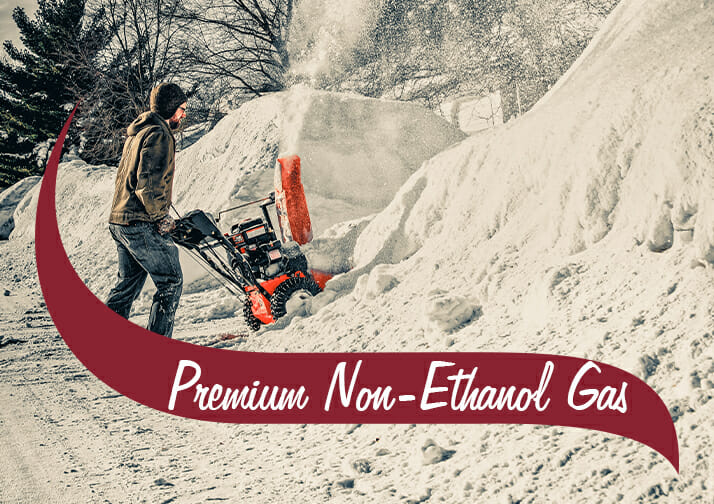
This image is property of e2rvpv7nqoq.exactdn.com.
Understanding Snowblower Engines
To fully comprehend the benefits of using premium gas, it is essential to understand the types of engines found in snowblowers and the fuel requirements associated with each.
Two-stroke vs. four-stroke engines
Snowblowers generally come equipped with either two-stroke or four-stroke engines. Two-stroke engines require a mixture of oil and gasoline for fuel, whereas four-stroke engines use separate gasoline and oil systems.
When it comes to fuel choice, premium gas is particularly advantageous for two-stroke engines. These engines tend to have higher compression ratios, making them more prone to knocking. By utilizing premium gas with higher octane levels, you can mitigate the risks of knocking and ensure optimal performance.
On the other hand, four-stroke engines can also benefit from premium gas, but the impact may not be as significant. These engines typically have lower compression ratios, making them less susceptible to knocking. However, the cleaner-burning properties of premium gas can still contribute to a smoother operation and prolonged engine life.
Fuel requirements for snowblowers
Snowblower manufacturers often provide recommendations regarding the fuel requirements for their specific models. These recommendations typically include the minimum octane rating and may specify whether regular or premium gas is preferred.
It is crucial to adhere to these guidelines to avoid potential issues with performance or engine damage. Using a fuel with a lower octane rating than recommended can lead to knocking and reduced power output. Conversely, opting for a higher octane level than required may not provide significant additional benefits, but it also won’t cause any harm.
Before fueling up your snowblower, consult the owner’s manual or reach out to the manufacturer for accurate fuel recommendations. Following these guidelines will ensure that your snowblower operates optimally and remains in good working condition.

This image is property of i.ytimg.com.
Considerations for Using Premium Gas
While the advantages of using premium gas in your snowblower are evident, there are a few considerations to keep in mind before making your decision. Let’s examine these factors and their potential impact.
Manufacturer’s recommendations
As mentioned earlier, it is crucial to adhere to the manufacturer’s recommendations regarding fuel choices for your snowblower. While premium gas can offer various benefits, some models may not require it or may perform similarly with regular gas. Always consult the owner’s manual or contact the manufacturer to confirm their specific recommendations.
Cost considerations
Using premium gas can often come at a higher price point compared to regular gas. However, the price difference may vary depending on your location and current market conditions. It’s essential to weigh the potential benefits against the increased cost to determine if the advantages provided by premium gas justify the additional expense for your specific snowblower.
Availability of premium gas
Another consideration when contemplating the use of premium gas is its availability. Not all gas stations may offer premium gas as an option, especially in remote or rural areas. Ensure that premium gas is readily accessible to you and consider the convenience factor when deciding if it is the right choice for your snowblower.
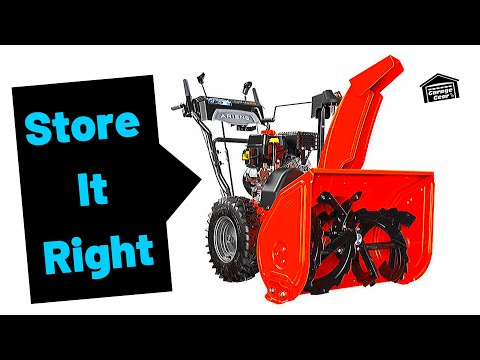
This image is property of i.ytimg.com.
Potential Risks of Using Regular Gas
While using regular gas may be acceptable for some snowblower models, there are potential risks associated with it. Let’s delve into these risks and understand why premium gas may be a safer choice.
Increased carbon build-up
Regular gas often lacks the same level of detergents and additives found in premium gas. As a result, using regular gas over an extended period can lead to increased carbon build-up within the engine. Carbon deposits can accumulate on spark plugs, valves, and fuel injectors, hindering their proper functioning and reducing overall engine performance.
By utilizing premium gas with its superior cleaning properties, you can significantly minimize carbon build-up in your snowblower’s engine. This, in turn, helps maintain optimal combustion and ensures your snowblower runs smoothly throughout its lifespan.
Reduced engine lifespan
Using regular gas in a snowblower that requires premium gas can have long-term consequences. The lower octane rating of regular gas can increase the likelihood of knocking, which may cause engine damage if left unaddressed. Continuous knocking can lead to premature wear and tear on crucial engine components, potentially shortening the overall lifespan of your snowblower.
By making the switch to premium gas, you can minimize the risks of engine damage and extend the longevity of your snowblower. The improved combustion and avoidance of knocking ensure that your snowblower operates flawlessly for many winters to come.
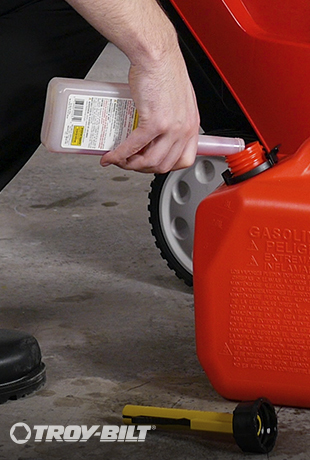
This image is property of www.troybilt.ca.
Tips for Choosing the Right Gas
Now that we have explored the benefits, considerations, and potential risks associated with gas choices, let’s discuss some practical tips to help you select the most appropriate gas for your snowblower.
Read the owner’s manual
The owner’s manual is an invaluable resource when it comes to determining the fuel requirements for your snowblower. It provides specific recommendations from the manufacturer, including the recommended octane rating and any additional considerations to keep in mind. Take the time to thoroughly read the manual and understand the fuel specifications before fueling up your snowblower.
Consult with a professional
If you are uncertain about the fuel requirements or unsure which type of gas to use, consider consulting with a professional. Visit a local snowblower dealer or reach out to a trusted mechanic who specializes in small engines. They can provide expert advice based on your snowblower’s make, model, and specific needs, ensuring you make an informed decision regarding your gas choice.
Consider climate conditions
Climate conditions can play a significant role in fuel performance and combustion. In colder regions, fuel can sometimes be prone to vapor lock or other issues that affect the engine’s operation. Premium gas with its higher octane rating and cleaner-burning properties can help mitigate these challenges, ensuring consistent performance even in chilly temperatures. If you reside in a colder climate, consider the advantages premium gas can offer in maintaining your snowblower’s reliability during harsh winter conditions.
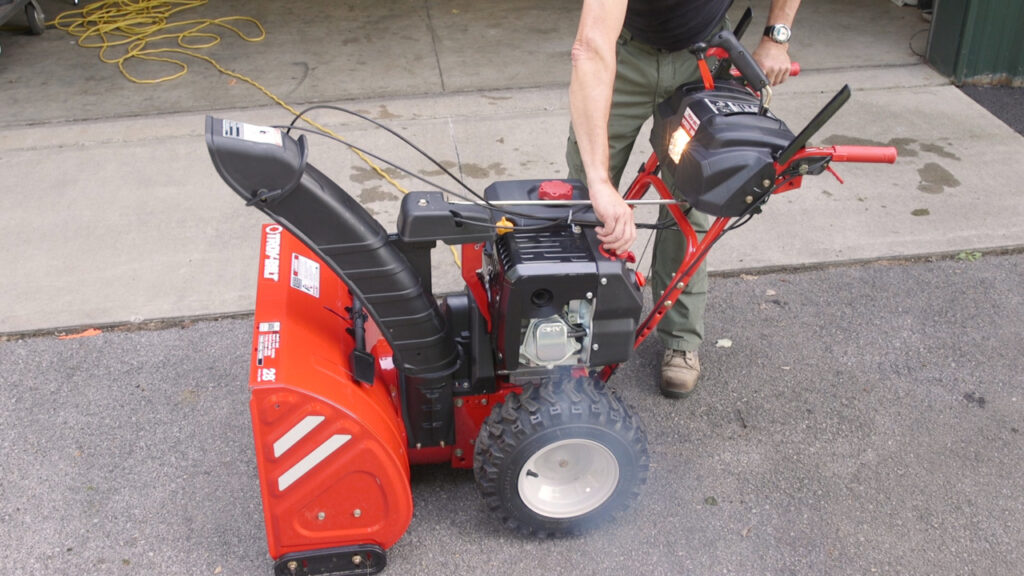
This image is property of cf-images.us-east-1.prod.boltdns.net.
Other Factors to Consider
Apart from fuel choices, there are a few other factors to consider when optimizing your snowblower’s performance and lifespan.
Storage conditions
Proper storage of your snowblower during the offseason is crucial. Ensure that you store it in a cool, dry place to prevent rust and other issues that can impact its functionality. Additionally, it’s essential to drain the fuel tank or use a fuel stabilizer to avoid deterioration or potential damage to the fuel system during storage.
Frequency of use
The frequency at which you use your snowblower can also impact its performance and fuel efficiency. Regular use can help keep the fuel system clean and prevent fuel-related issues. However, if your snowblower sits unused for extended periods, it’s advisable to use a fuel stabilizer to prevent fuel degradation and ensure optimal performance when it’s time to use it again.
By considering these factors and making informed choices regarding fuel, storage, and usage, you can maximize the performance and lifespan of your snowblower, ensuring that it remains a reliable companion during snowy winters.
In conclusion, the benefits of using premium gas in your snowblower are numerous – from improved engine performance to preventing fuel system damage. Understanding the type of engine your snowblower has and its fuel requirements is crucial in making the right choice. While regular gas may seem like a more cost-effective option, the potential risks it poses, such as increased carbon build-up and reduced engine lifespan, make premium gas a safer and more beneficial choice for most snowblower models. Remember to consult the manufacturer’s recommendations, consider cost and availability, and weigh the advantages and disadvantages before making your decision. By following these tips and considering other factors such as storage conditions and frequency of use, you can ensure that your snowblower remains in optimal condition, ready to tackle those snowy days with ease!
